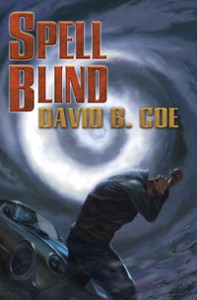My Facebook page was hopping today, because I asked for people’s opinions on the title for the book I’ve been working on. The book is the third in my new series from Baen, The Case Files of Justis Fearsson. The first two books in the series are called Spell Blind (released earlier this month) and His Father’s Eyes (coming out in August). The list of possible titles from which I asked people to choose included:
The Pale Blade (or Knife), The Stone Knife (or Blade), The Lost Blade (or Knife), The Necromancer’s Blade, The Killing Blade, The Blood Blade.
And the responses I got were fascinating, and made me think about what goes into a title, what makes a title work or not work.
First let me say that I’m grateful to all who have offered opinions thus far. I really am paying close attention to responses, because I want to get this right. Over the years, I feel that I’ve done pretty well with my book titles. There are one or two that I think could have been stronger, but generally speaking I feel good about the titles I’ve chosen. (Among my favorites: The Outlanders, Seeds of Betrayal, Weavers of War, The Sorcerers’ Plague, A Plunder of Souls, Dead Man’s Reach, His Father’s Eyes)
But, of course, it’s entirely subjective. Others might not like any of those I’ve just listed, and might feel that one of the titles I didn’t mention as a favorite is better than all of them.
As an author, I want a title that sounds cool, whatever the hell that means. I want it to have a certain poetry, a cadence that rolls off the tongue. I also want it to conjure imagery that is both intriguing and representative of some key element of the book. But again, even these criteria are subject to personal taste. Today alone I’ve had someone tell me that he/she loves the title The Pale Blade because of the repeated long “a” sound. And I’ve had another reader say that the title doesn’t work for him/her for the exact same reason. Some folks love the word Necromancer, and others feel that I should avoid it at all costs. The Pale Blade emerged as a clear favorite, but it also elicited the most forceful negative responses. “It’s mysterious.” “It sounds cool.” “It’s boring and plain.” “It’s weak.”
Now, one might think that all these contradictory opinions would cloud the issue for me and make what will ultimately be my choice that much harder. But the fact is, the feedback is valuable if for no other reason than because I react to these arguments in a visceral way. And my responses give me a sense of where I’m leaning, what direction I think I might want to go.
I haven’t come to a decision yet (so feel free to weigh in on the discussion). Right now I’m thinking strongly about Pale Blade (without the “The”) and Lost Blade. But that could change. It’s possible that something will come to me that I haven’t even considered yet. So stay tuned. And again, thanks for the input.










